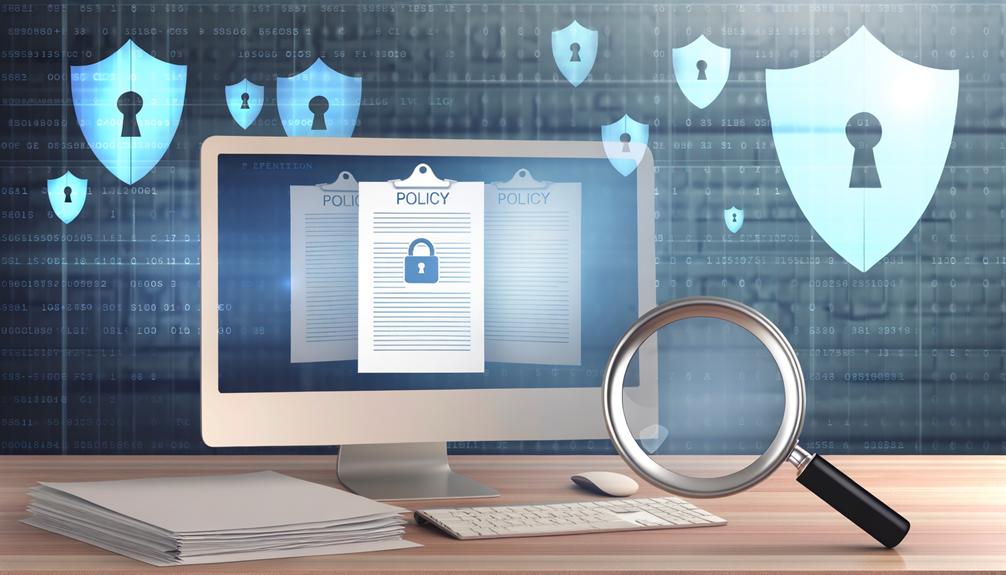Table of Contents Show
Yes, small businesses need cyber insurance to protect them from the severe impact of cyber attacks. Cybercriminals often target small businesses because they see them as easy prey. Without insurance, a cyber incident could cost you around $200,000.
Cyber insurance covers legal fees, data recovery, and system repairs, helping you bounce back quickly. It also guarantees you comply with regulations, avoiding hefty fines and maintaining customer trust. Don’t gamble with your business’s future—cyber insurance is essential for safeguarding your operations and reputation. Discover how to choose the right policy that matches your specific needs.
Key Takeaways
- It covers financial losses from cyberattacks, including legal fees, data recovery, and system repairs.
- Ensures compliance with data protection laws and avoids significant fines.
- Helps maintain customer trust by facilitating quick and effective breach response.
- Provides access to experts in computer forensics and public relations for effective recovery.
- Supports business continuity by mitigating financial risks and ensuring long-term sustainability.
Cyber Threat Landscape
In today’s digital age, small businesses face a challenging cyber threat landscape that can’t be ignored. Cyber attacks target small businesses, making up 43% of all incidents. However, only 14% of small businesses are prepared for these threats.
This lack of readiness leaves you vulnerable to cyber incidents that can compromise your sensitive data and disrupt your operations.
Cyber threats aren’t just a distant possibility but a real and pressing danger. Cybercriminals often see small- and medium-sized businesses as easy targets due to their limited resources and defenses. A single cyber incident could result in severe economic costs, reputational damage, and legal consequences if you’re not vigilant.
These attacks could force you to close your doors within just six months. Understanding the seriousness of these risks and taking proactive measures is essential. Investing in a cyber insurance policy is one way to protect your business.
This policy can help mitigate the impacts of cyber incidents, safeguarding your sensitive data and ensuring your business continuity. Don’t underestimate the importance of being prepared. The cyber threat landscape is real, and it’s coming for you.
Financial Implications
Facing the financial aftermath of a cyberattack without insurance can cripple your small business. Your business needs cyber liability insurance to cover hefty financial costs, averaging around $200,000 per incident. For small businesses, this can mean struggling to cover legal fees, customer notification expenses, data recovery costs, and system repairs. Cyber insurance helps shoulder these burdens, allowing you to focus on getting your business back on track.
Data breaches often target personally identifiable information (PII), making small businesses particularly vulnerable. Without cyber insurance, the financial impact of losing customer PII can be devastating. You’ll face the cost of notifying affected customers and the expenses involved in data recovery and system repair. Cyber insurance mitigates these financial risks and provides a safety net for your business.
Additionally, state regulations often require businesses to notify customers in the event of a data breach. Failure to comply can result in steep financial penalties. Cyber insurance assists with compliance, reducing the likelihood of fines and further financial strain.
For small businesses, having cyber insurance isn’t just a smart decision; it’s essential for financial stability in an increasingly digital world.
Legal and Regulatory Requirements

Compliance with legal and regulatory requirements is another vital reason small businesses need cyber insurance. State regulations often mandate that businesses notify customers in the event of a data breach. This can be costly, especially if you don’t have insurance to cover notification costs. Cyber insurance helps you adhere to these regulatory obligations by covering the expenses of notifying affected individuals.
Small businesses can face severe legal fees and penalties for failing to comply with data protection laws. Cyber insurance provides the financial support you need to meet these legal requirements and avoid devastating fines. Imagine the peace of mind you’ll have knowing you’re protected against the high costs of compliance and potential legal battles.
Furthermore, cyber insurance policies are designed to help you manage these legal requirements efficiently. With the right policy, you can ensure that you meet all regulatory obligations without draining your financial resources.
In today’s digital age, overlooking data protection and compliance can jeopardize your business. Cyber insurance isn’t just a safety net; it’s an essential part of your risk management strategy. Don’t wait until it’s too late—secure your business now.
Reputation Management
Your business’s reputation can take a severe hit after a cyber breach, making it essential to manage the fallout effectively. Damage to your reputation can be critical, especially for small businesses. When customer trust is compromised, they may hesitate to return, impacting your bottom line.
Breaches involving financial information can result in heavy fines and tarnish your company’s image. Non-compliance with PCI Security Standards Council regulations can lead to penalties, further damaging your reputation. Customers expect businesses to protect their data, and failing to do so can have lasting effects.
Without a breach response plan, you might find yourself scrambling, shifting focus from customer service to recovery efforts. This can hurt your ability to maintain customer relationships. Recovery efforts require a proactive approach. Cyber insurance can support you in establishing a breach response plan, ensuring you’re prepared to act quickly and effectively.
Data Breach Recovery

Recovering from a data breach requires prompt and effective measures to minimize damage and restore operations. When your small business faces such an incident, the road to recovery can be challenging. Cyber insurance plays an important role in this process, helping you navigate the aftermath with fewer financial losses and less reputation damage.
Here’s why cyber insurance is essential for your data breach recovery:
- Financial Coverage: Cyber insurance covers costs for legal fees, customer notifications, data recovery, and system repairs. Without it, your business could face crippling financial losses.
- Credit Monitoring: Policies often include credit monitoring services for affected customers, helping you maintain trust and protect your clients from further harm.
- Specialized Services: Cyber insurance provides access to computer forensics and public relations experts, ensuring you can effectively manage a breach’s technical and reputational fallout.
Risk Mitigation Strategies
Implementing effective risk mitigation strategies is essential for small businesses to protect against cyber threats. With 43% of cyber attacks targeting small businesses, it’s vital to recognize the importance of cyber security. Many small businesses lack adequate security measures, making them vulnerable to data breaches and cyber-attacks. You need to be proactive in safeguarding your business.
First, consider investing in strong cyber insurance. This can help mitigate the economic costs, reputational damage, and legal consequences that follow a cyber attack. Cyber insurance is a safety net, providing financial support to recover from data breaches and enhancing your overall cybersecurity posture.
Next, implement robust security protocols. Update software regularly, use strong passwords, and educate employees on recognizing phishing attempts. These steps reduce the risk of cyber-attacks and protect sensitive data.
Additionally, conduct regular security audits to identify and address vulnerabilities. This ongoing vigilance is key to maintaining a secure environment.
Choosing the Right Policy

After implementing risk mitigation strategies, selecting the right cyber insurance policy tailored to your business’s specific needs is the next critical step. You must assess your business’s specific risks and requirements to make an informed choice.
Here’s what to take into account:
- Coverage Limits and Exclusions: Understand the coverage limits and deductible amounts. Be aware of any exclusions that might leave you vulnerable.
- Types of Cyber Incidents: Evaluate the cyber incidents most likely to affect your small business. Make sure your policy adequately covers these risks, including legal fees and data recovery costs.
- Thorough Coverage: Look for policies that offer thorough coverage. This should include legal fees, data recovery costs, customer notifications, and system repairs.
Don’t underestimate the complexity of choosing the right policy. Seek expert advice from cybersecurity professionals or insurance agents. They can help you navigate the intricacies of cyber insurance.
Small businesses can’t afford to overlook the importance of a well-chosen cyber insurance policy. It’s not just about ticking a box; it’s about safeguarding your livelihood. Ensure your policy provides robust protection against the most relevant threats to your business.
Act now to secure your future.
Conclusion
So, is cyber liability insurance the right choice for your business?
You can’t afford to ignore cyber insurance. Did you know that 60% of small businesses fold within six months of a cyber attack? That’s a staggering figure.
Cyber insurance helps cover the costs of data breaches, legal fees, and reputation damage. It’s not just a safety net; it’s a lifeline.
Protect your business now before it’s too late. Don’t wait until disaster strikes—act today and secure your future.
For more information, visit the National Cyber Security Alliance (NCSA) and the Small Business Administration (SBA) Cybersecurity Portal.






